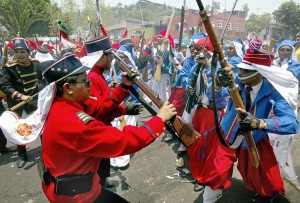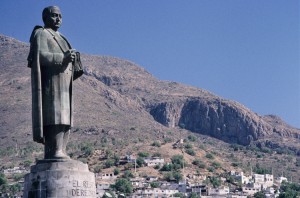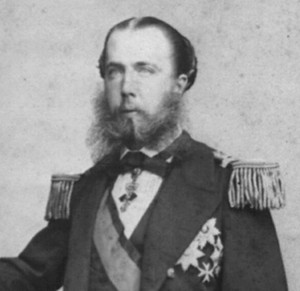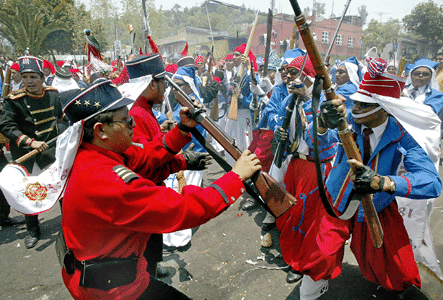Cinco de Mayo’s Battle of Puebla
Friday, May 5th, 2017May 5, 2017
Today, May 5, is Cinco de Mayo, a holiday celebrated in Mexico and in many communities throughout the United States. Cinco de Mayo is Spanish for Fifth of May. Many people know that Cinco de Mayo commemorates the victory of a Mexican army over a French army at the Battle of Puebla on May 5, 1862. But few people know much about the battle itself, which took place near Puebla, a city in central Mexico, during a French invasion of Mexico. Mexican forces won the Battle of Puebla, but their victory did not stop the French from taking control of Mexico. A French-supported government led by Emperor Maximilian ruled Mexico from 1864 until 1867, when Maximilian was killed and the Mexican republic was restored.

People participate in a reenactment of the Battle of Puebla in Mexico City, the capital of Mexico. The battle took place on May 5, 1862, and is remembered by the holiday of Cinco de Mayo (Spanish for Fifth of May). Credit: © Jorge Uzon, AFP/Getty Images
In April 1862, a force of some 6,000 French troops marched inland from the port city of Veracruz, intending to take Mexico City, the nation’s capital. Puebla lay along the route to the capital, and Mexican General Ignacio Zaragoza assembled about 4,800 troops nearby to stop the French advance. On April 28, the French won an initial battle at Acultzingo Pass leading to Puebla. Zaragoza then withdrew to Puebla, which was protected by fortifications on two large hills—Guadalupe and Loreto—and other defenses.

Mexican President Benito Juárez (seen here in a statue in central Mexico) was forced from power in 1864, but he returned to lead Mexico in 1867. Credit: © AA World Travel Library/Alamy Images
On May 5, 1862, French artillery began bombarding Puebla’s defenses, and an infantry assault soon followed. The French attack failed under the concentrated fire from Puebla’s defenders. A second attack also failed, but the French refused to quit and launched a third attack. It too failed. Suffering heavy casualties (people killed and wounded), the French called off the assault. Mexican cavalry then attacked the French as they attempted to withdraw, inflicting still more casualties. With the battle lost, the French eventually retreated to Orizaba, a city midway between Puebla and Veracruz.
The French suffered nearly 500 casualties at Puebla, including more than 100 killed in action. Mexican losses were about 85 dead and more than 100 wounded. Despite the defeat, the French recovered quickly. After receiving about 30,000 reinforcements the following autumn, the French renewed their march toward Mexico City. The French won the second Battle of Puebla in May 1863 and then pushed on to take Mexico City. Mexican President Benito Juárez was forced into hiding, and the French installed Archduke Maximilian of Austria as emperor of Mexico in 1864.

The French installed Archduke Maximilian as emperor of Mexico in 1864. Rebel Mexican forces captured and executed Maximilian in 1867. Credit: Andrew Burgess, Library of Congress
After the bloody American Civil War ended in the spring of 1865, the United States threatened to intervene to remove the French from Mexico. The French then began withdrawing their forces in 1866. At the same time, a resistance movement led by Juárez increased attacks on the French and Mexican troops loyal to Maximilian.
In February 1867, Maximilian and his army withdrew north of Mexico City to the city of Querétaro, where Mexican rebels soon besieged them. In May, Maximilian was betrayed by one of his officers and captured by rebel troops. The emperor—who had ordered all Juárez supporters caught bearing arms to be shot—was himself executed by firing squad on June 19, 1867. The Mexican republic was then restored, and Juárez again became president.



